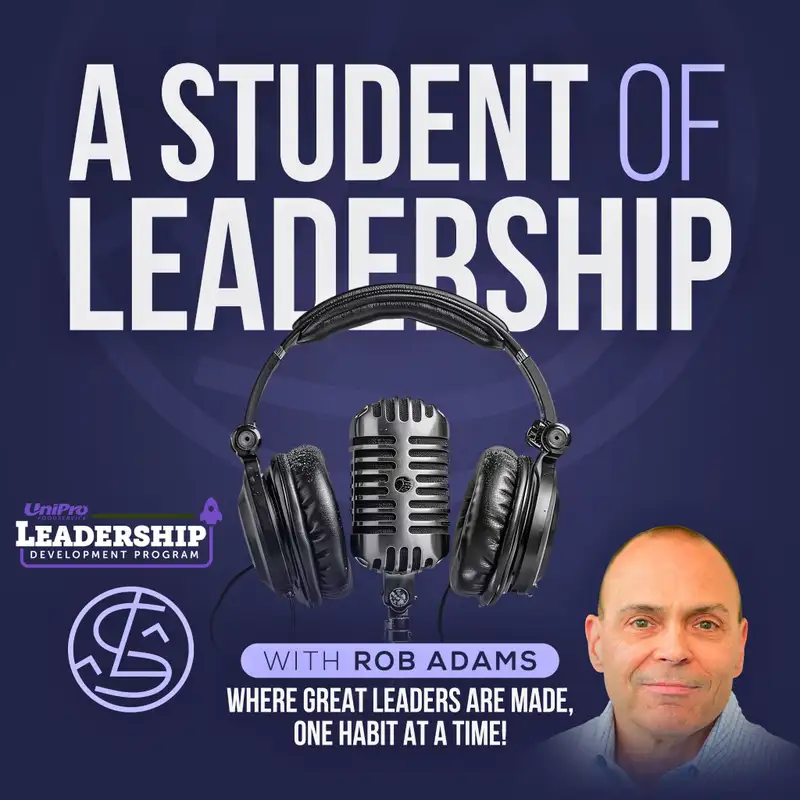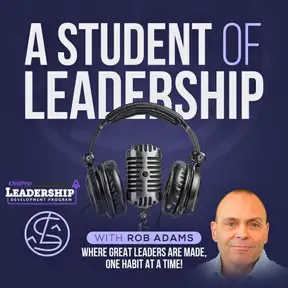Episode 14 - Leadership Gratitude
Download MP3Hello, and welcome to A Student of Leadership. The podcast that uncovers the secrets of exceptional leaders. Join host Rob Adams as he explores the critical habits and practices that define leadership greatness. One transformative episode at a time. From cultivating a compelling vision to embodying courage, empathy, accountability, and resilience.
Otro:You'll gain the tools and insights to elevate your leadership impact no matter where you are on your journey. Whether you're a seasoned executive or stepping into your first leadership role, each conversation will inspire and equip you to become the leader you were always meant to be. Let's dive in.
Rob Adams:Hey, students of leadership. Welcome back to our micro podcast. And that's right, we are called a student of leadership, and that is where great leaders are made one habit at a time. I'm Rob Adams, your host, and today we are focusing on gratitude, a leadership habit transforming relationships and creating lasting impact. Gratitude isn't just about saying thank you.
Rob Adams:It's about creating a culture where people feel genuinely seen, valued, and appreciated for their contributions. When practiced authentically and consistently, gratitude becomes a very powerful catalyst for building trust, fostering loyalty, and inspiring exceptional performance. It's one of those leaders' most underutilized yet transformative tools. In this episode, we'll explore how intentional gratitude can revolutionize your leadership impact, share a compelling example of gratitude in action, and provide practical ways to make meaningful appreciation a natural part of your leadership style. Now, one powerful example of gratitude in leadership comes from Alan Mulally, the former CEO of Ford Motor Company.
Rob Adams:When Mulally took over in 02/2006, Ford lost $17,000,000,000 and faced potential bankruptcy. What set his leadership apart wasn't just his strategic acumen, it was his deliberate practice of gratitude and recognition. Mullally instituted a weekly business plan review meeting where leaders were encouraged to share problems openly. Instead of punishing bearers of bad news, he would applaud their transparency saying, Who can help? This created a culture where honesty was met with appreciation rather than criticism.
Rob Adams:Beyond these meetings, Mullally made it his mission to connect with employees at all levels personally. He would regularly visit factory floors to inspect operations and thank workers personally for their role in Ford's transformation. He kept thank you notes in his pocket to hand out on the spot when he witnessed someone embodying Ford's values. Under his leadership, Ford avoided bankruptcy and returned to profitability without government bailouts, and employee satisfaction reached record highs. Mulally's story demonstrates that gratitude isn't just a nice to have leadership trait, it's a fundamental driver of organizational transformation and success.
Rob Adams:Melody Beattie wrote, gratitude unlocks the fullness of life. It turns what we have into enough and more. This insight reminds us that gratitude does more than acknowledge the past. It transforms our present perspective and shapes future possibilities. In leadership, this mindset shift is crucial for building resilient, motivated teams that see challenges as opportunities rather than obstacles.
Rob Adams:Now here are some reflection questions. How do you ensure your expressions of gratitude are specific, timely, and meaningful? How could you make gratitude more visible and contagious within your team culture? What barriers prevent you from expressing gratitude more frequently, and how can you overcome them? A 2022 study from the Greater Good Science Center at UC Berkeley titled The Impact of Gratitude on Organizational Performance revealed that teams led by leaders who practice regular gratitude show a whopping 50% higher productivity and 27% lower turnover rates.
Rob Adams:Even more striking, these teams demonstrate greater innovation and resilience during challenging times, with team members being three times more likely to take productive risks and support each other through the difficulties. Here are three powerful ways to integrate authentic gratitude into your leadership. Number one, practice specific recognition. Instead of general thanks, that was awesome, congratulations, acknowledge the specific action it impacts and why it matters. For example, thank you for staying late for helping the team meet that deadline.
Rob Adams:Your dedication ensured we delivered on time and inspired others to go the extra mile. Number two, create gratitude rituals. Establish regular practices that make gratitude visible and contagious. Start meetings with appreciation moments, maintain a gratitude journal, or implement a peer recognition program. And number three, connect gratitude to growth.
Rob Adams:When giving feedback or discussing challenges, start by genuinely appreciating effort and progress. This creates psychological safety and opens people to learning and development. Remember that authentic gratitude isn't about frequency, it's about impact. Make each expression and appreciation meaningful by being specific, timely, and genuine. Your action challenge for this week is create a gratitude map.
Rob Adams:It's a map of your team or organization. Identify three people at different levels who contributions have often gone unrecognized. For each person, write down specific examples of their impact and express your appreciation in a way that's meaningful to them. Document how this intentional gratitude affects your relationships and the team dynamics. Gratitude is way more than a leadership habit.
Rob Adams:It's a transformative force that can reshape relationships, motivation, and organizational culture. As you work on this week's action challenge, remember that every authentic expression of appreciation plants seeds of trust and engagement that grow into lasting impact on your teams and your organization. Next week we will explore delegation, a crucial skill that empowers your team and amplifies your leadership impact by enabling you to focus on what truly matters. Until then, keep practicing the habits that make great leaders, and remember, great leaders are made one habit at a time. See you next time on A Student of Leadership.
Rob Adams:Take care, everyone.
Otro:Thanks for tuning in to this episode of A Student of Leadership. If you liked what you heard, then be sure to subscribe and share with like minded people. Have a burning question for Rob or a topic you'd love him to discuss on the show? Get in touch on socials. We'd love to hear from you.
Otro:We'll see you next time. And remember, great leaders are made one habit at a time.
Creators and Guests


